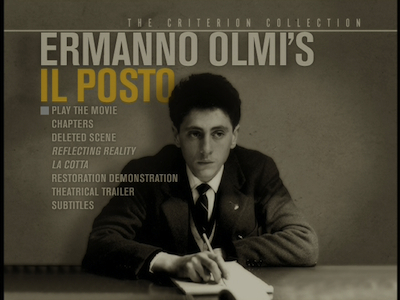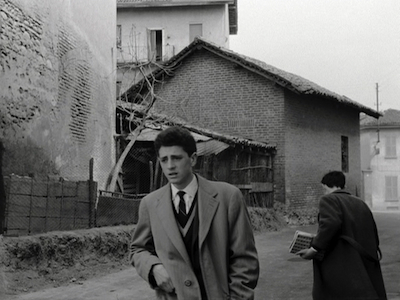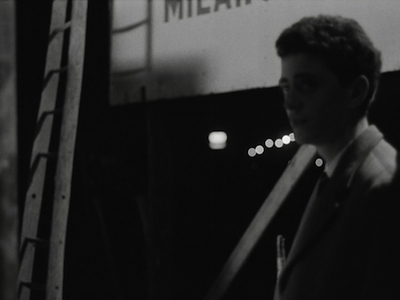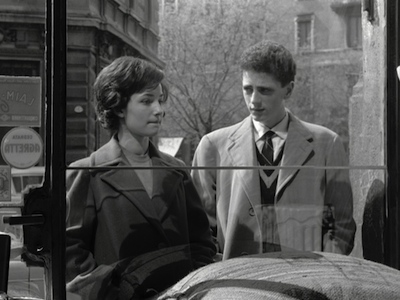
There is a point in all lives where the promise of youth tragically crashes into the reality of adulthood, a moment when hopes are crushed. Even if a better tomorrow is waiting, things will never be the same. Life cannot be polished back to its original shine.
It's this clash that writer/director Ermanno Olmi tries to capture in his 1961 film Il Posto (The Job). Co-written by Ettore Lombardo, Il Posto is the story of Domenico Cantoni (Sandro Panseri), a teenager from the tiny town of Meda who is sent into Milan to find a job. His younger brother is in school now, and though Domenico has ambitions of being a surveyor, he is expected to earn a wage and make the way clear for his sibling. Seems simple enough, and not altogether terrible. Though nervous about his commute into the city, there is something in Domenico's bearing that suggests he is experiencing an escape, a break from the norm. If nothing else, Milan is different.

Once at the nameless corporation where he has his appointment, Domenico is shuffled into a room with a bunch of other potential employees, most of them young, some of them pitifully older. They take a written exam in the morning, and they are subjected to physical tests and psychological evaluations in the afternoon. All for a simple clerkship. Have you ever had to fill out one of those bizarre questionnaires that the big chain stores like to give applicants? The ones that pose quasi-moral situations and probe around in your personal history? Imagine taking one of those verbally. Points to Domenico for mostly keeping a straight face when asked if he finds the opposite sex repulsive.
Because, of course, he doesn't. At lunch he met an adorable young woman, Antonietta (Loredana Detto), nicknamed Magali, which is French and kind of exotic. Antonietta is pretty and she's friendly and she and Domenico have a good time wandering around on their break. So much so, they are almost late for the second phase of the interview. The girl is talkative, the boy is shy, but he's a little gentleman, old-fashioned and small-towned. He waits for her to board her bus going to her hometown before getting on the train that will take him back to his. Young men, take notes! This is how it's done.


For Domenico, he's now less interested in getting employed for the sake of earning money than he is so he can see Antonietta again. The look of elation on his face when she walks in the waiting room is priceless. Though Panseri wasn't really a professional actor, Olmi manages to get an exceptional performance out of him. A withdrawn character, Domenico is self-contained. His expressions are never broad, they are not messages to the outer world so much as they are messages of personal affirmation or distress. A smile, a quiver of fear, doubt--the actor is portraying an ongoing conversation with the self.

Il Posto is set firmly in the Italian Neorealist tradition. Using real locations, real audio, and non-actors, Ermanno Olmi cuts his film to the rhythm of everyday life. The clock moves slow for the wage slave, even if Il Posto does not. Domenico and Antonietta are assigned to different buildings, and weeks pass before the boy can find her again. Every timid romantic out there will understand what it's like to wait outside a doorway in hopes that maybe that one special person will pass through it. The anticipation, the excitement...the disappointment.
Loredana Detto has a winning personality on screen. It's a shame she never made another movie. She married her director and that was the end of her acting career. Ermanno Olmi, you owe us an apology for that one. Antonietta is every young boy's dream. She's attractive, sweet, and outgoing, and she gives Domenico just enough attention to make his heart vibrate in just the right way. If he could only figure out how to say the right things, how to see her more, all of this would be worth it.

Except he won't, and that's what is so crushing about Il Posto. Antonietta comes to represent the youthful dreams that stagnate in an office building and the drudgery a job enforces. Once Domenico accepts his position as a messenger, Olmi breaks away from his lead for the first time. He takes us on an evening tour of the off-the-clock activities of the accounting staff that Domenico will eventually join. Some have very common, uninspired existences, others harbor their youthful folly as if it were rare treasure. There is the older man who goes to the pub and sings a song that is intended for someone not so advanced in years, and the would-be novelist who scribbles out his book in secret, hiding his light under a towel. Domenico tells his new boss that he may still go to night school to pursue the vocation he wants, but Olmi is showing us the true likelihood of that happening. Domenico's father told his son that a job like this one is for life, and as the boy will learn, these positions tend to only open up when somebody dies.


Much of Olmi's framing is intentionally expressionistic. The corporate world alternates between imposing, with the workers appearing small next to the business structure, and claustrophobic, cramped into their own little spaces. On the other hand, though Ermanno Olmi and cameraman Lamberto Caimi shot Il Posto in such a way to show life as it was, hoping to render the dreary gray of an average day, the black-and-white photography has taken on a nostalgic beauty over the years. Domenico and his peers just look more stylish, with their clean haircuts and their suits and ties, than we expect our youths to look today. Looking at Il Posto is like looking at photographs in a vintage magazine back issue: by being frozen in time, the images seem simpler, more desirable, than the busy world we're used to today. Maybe that was by design. Maybe Olmi wanted it all to look hopeful and modern if only to add to the impact of the crushing blows to come.
The subverted ending of Il Posto sneaks up on the audience. We've been trained to expect something more, just like Domenico. We realize that there is nothing else mere moments before he does, and we can only brace ourselves for the heartbreak that is coming.


2 comments:
Nice review. I just reviewed the film myself, and always like to compare notes with others afterwards. Crazy that Loredana Detto was just 15 when she made the film, and I agree that she should have been in many more. What a beauty!
I'll be looking forward to seeing this film again now that I've seen it for the first time. Much as I will return to your blog to compare notes again. Cheers!
What an excellent movie! I love movies but I’m not a critic. More than a comment I have a question: What’s the message or meaning of Antonietta no showing to the company party?
Post a Comment